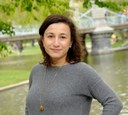B001 Sparks - The Databasement
Jodi Guy
All interested members of the Penn State community are welcome to attend.
C-SoDA Conference – New Faces in Political Methodology X
New Faces in Political Methodology X was held on Saturday, April 28, 2018, and featured:
 Taylor Carlson (University of California, San Diego)
Taylor Carlson (University of California, San Diego)
"Through the Grapevine: Informational Consequences of the Two-Step Flow of Political Communication." This paper was published -- as "Through the Grapevine: Informational Consequences of Interpersonal Political Communication" -- in American Political Science Review (2019).
2018 Bio: Taylor Carlson is a Political Science Ph.D. candidate at the University of California, San Diego, focusing on political communication and political psychology in American Politics. In her dissertation, she uses innovative experiments and text analysis to examine how political information gets distorted as it flows through communication networks --and why it matters. Beyond her dissertation, she maintains an active research agenda with several collaborators, broadly focusing on interpersonal political communication. Her research has been published in the Journal of Politics and Political Behavior and she is building toward two coauthored books. Taylor is equally passionate about researchand teaching and enjoys helping students understand, evaluate, and conduct social science research.
Taylor is expected to receive her Ph.D. in 2019 and will join the Department of Political Science at Washington University in St. Louis as an Assistant Professor in Fall 2019.
 Ted Enamorado (Princeton University)
Ted Enamorado (Princeton University)
"Using a Probabilistic Model to Assist Merging of Large-scale Administrative Records." (co-authored with Ben FIfeld and Kosuke Imai). This paper was published in American Political Science Review (2019).
2018 Bio: Ted Enamorado is a Ph.D. Candidate in the Politics Department (Political Economy Program) at Princeton University. He develops computational methods for quantitative research, with a special emphasis on data integration. Substantively, his work focuses on comparative political economy, and aims to understand the political consequences of different electoral rules. Ted's work has been published in Journal of Politics, Economics Letters, and Journal of Development Economics. He holds an M.A. from Vanderbilt University and a B.A. from Universidad Católica de Honduras.
Ted is expected to receive his Ph.D. in 2019 and will join the Department of Political Science at the University of North Carolina as an Assistant Professor in Fall 2019.
 Margaret Foster (Duke University)
Margaret Foster (Duke University)
"Over Pressure: Grassroots-Driven Transformation of (Militant) Organizations."
2018 Bio: Margaret Foster is a Ph.D. candidate at Duke University. Her dissertation and book project proposes a theory of grassroots-driven, pressure for strategic change in resource-constrained organizations. For the project, she is using a multi-method research design, including formal modeling, and text-as-data, and qualitative case studies.Additional projects explore the pathways through which network connections influence the trajectories of information exchange and issue evolution in extremist online communities, measuring hierarchy and influence in thematic communities, and drivers for the diversity of organizational structures among militant groups. Her research interests include quantitative and computational methods for political science, particularly applied Bayesian statistics, text-as-data, and network analysis.
Margaret is expected to receive her Ph.D. in 2020.
 Zachary Jones (Pennsylvania State University / University of Washington)
Zachary Jones (Pennsylvania State University / University of Washington)
"Interpretable Statistical Learning Methods."
Zach Jones holds a Ph.D. in Political Science from Pennsylvania State University and is currently a Moore/Sloan data science postdoctoral fellow at the eScience Institute at the University of Washington. Zach is a political methodologist interested in interpretable machine learning, its application to the study of political violence, and social science generally. He is also interested in meta-scientific issues related to the analysis of social data. His work has appeared in American Political Science Review, American Journal of Political Science, Political Science Research & Methods, PLoS One, Journal of Machine Learning Research, and Journal of Open Source Software.
 Mayya Komisarchik (Harvard University)
Mayya Komisarchik (Harvard University)
"How to Measure Legislative District Compactness If You Only Know it When You See it." (co-authored with Aaron Kaufman and Gary King.) This paper is now forthcoming in American Journal of Political Science.
2018 Bio: Mayya Komisarchik is a Ph.D. Candidate in the Harvard University Department of Government studying American politics and political methodology. Her substantive research interests include: race and representation; the Voting Rights Act and the politics of formerly preclearance jurisdictions after Shelby v. Holder, police brutality, immigration, and political incorporation.
Mayya is expected to receive her Ph.D. in 2019 and will join the Department of Political Science at the University of Rochester as an Assistant Professor in Fall 2019.
 Chloe Lim (Stanford University)
Chloe Lim (Stanford University)
"Can Fact-checking Prevent Politicians from Lying?"
2018 Bio: Chloe Lim is a Ph.D. candidate in the Department of Political Science at Stanford University. Chloe studies media and political accountability, fact-checking, and political communication in American Politics. Her methodological interests include causal inference and text as data methods. In her dissertation, she evaluates whether fact-checking has been successful in deterring candidates from repeating debunked claims.
 Alexandra Siegel (New York University)
Alexandra Siegel (New York University)
"Tweeting Beyond Tahrir: Ideological Diversity and Political Intolerance in Egyptian Twitter Networks." (co-authored with Joshua Tucker, Jonathan Nagler, and Richard Bonneau.) This paper is currently in R&R status at American Journal of Political Science.
2018 Bio: Alexandra Siegel is a political science PhD candidate at New York University and a Graduate Research Associate at NYU's Social Media and Political Participation Lab (SMaPP). Beginning in September 2018, she will be a postdoc at Stanford's Immigration Policy Lab (IPL). Her research uses social media data, social network analysis, and textual analysis---in addition to more traditional data sources---to explore mass and elite political behavior in the Arab World. She is a former Junior Fellow at the Carnegie Endowment for International Peace and a former CASA Fellow at the American University in Cairo. She holds a Bachelors in International Relations and Arabic from Tufts University.
Alexandra receive her Ph.D. in 2018 and is currently a Postdoctoral Fellow at Stanford University's Immigration Policy Lab.
 Michelle Torres (Washington University in St. Louis)
Michelle Torres (Washington University in St. Louis)
"Give Me the Full Picture: Using Computer Vision to Understand Visual Frames and Political Communication"
2018 Bio: Michelle Torres is a Ph.D. candidate in the Department of Political Science and an A.M. in Statistics student in the Department of Mathematics at Washington University in St. Louis. She is from Mexico City, where she obtained a B.A. in Political Science and International Relations from CIDE. Her broad interests are in the fields of political methodology and political behavior, with a special interest in survey methodology, computer vision, causal inference, and public opinion. Her work has appeared in the American Journal of Political Science, American Politics Research, Public Opinion Quarterly, and Research & Politics.
Michelle is expected to complete her Ph.D. in 2019 and will join the Department of Political Science at Rice University as an Assistant Professor in Fall 2019.
